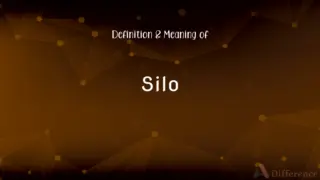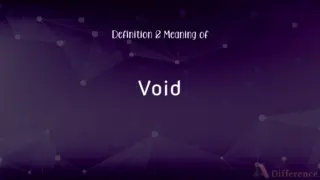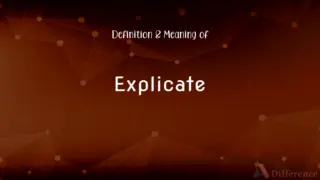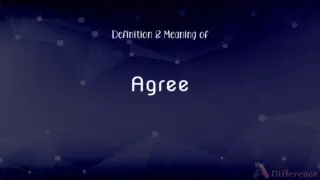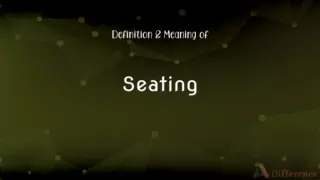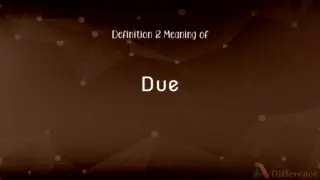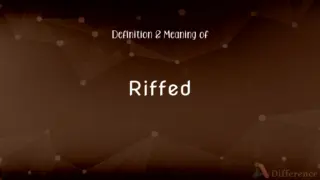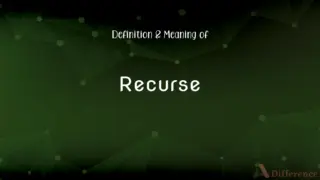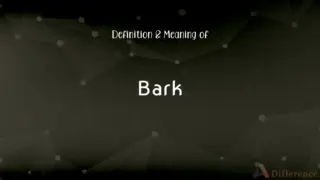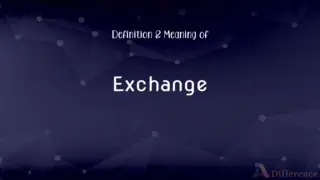Understand Definition and Meaning
Edited by Tayyaba Rehman — By Maham Liaqat — Published on March 8, 2024
Understand means to grasp the meaning, significance, or nature of something. e.g., It's important to understand the instructions before starting the test.
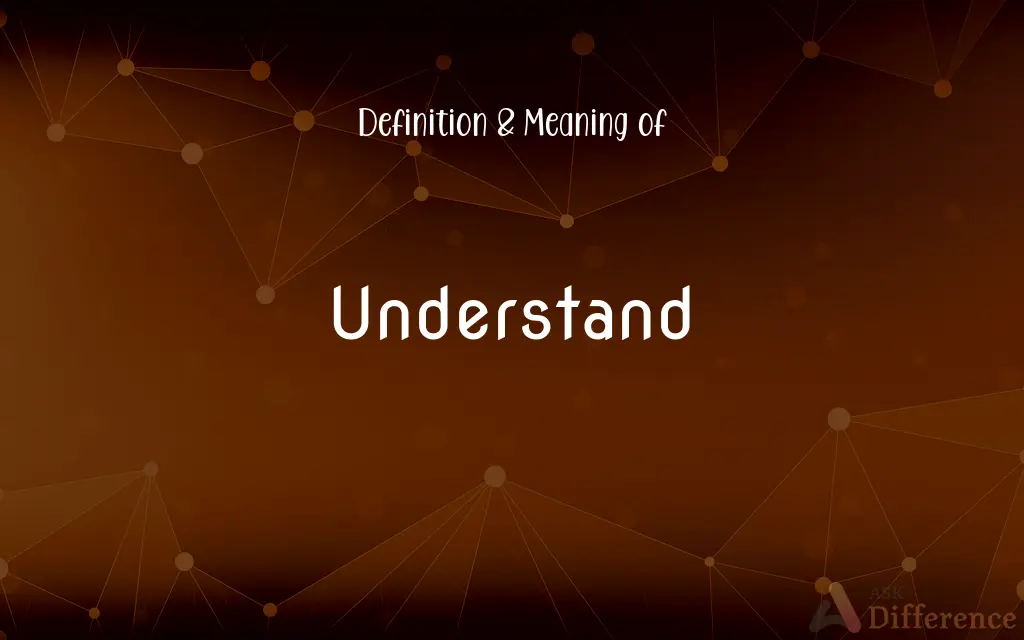
Table of Contents
Understand Definitions
To be sympathetically or empathetically aware of someone's feelings.
As a parent, she understands her children's needs intuitively.
To accept someone's point of view or reasoning.
I understand your concerns, but the benefits outweigh the risks.
To interpret or construe in a particular way.
The contract was understood to be binding.
To have mutual comprehension or communication.
They understand each other without needing to speak.
To acknowledge or recognize the truth or reality.
She understands the challenges ahead but remains optimistic.
To comprehend the meaning of spoken or written words.
She understands Spanish better than she speaks it.
To grasp the underlying principles or reasons.
He understands the basics of physics quite well.
To infer or perceive the intended meaning.
I understand your hesitation, but it's a safe investment.
To have a thorough or deep knowledge of a subject.
He understands the complexities of the legal system.
To assume or believe something to be the case.
We understand that the meeting has been postponed.
To become aware of the nature and significance of; know or comprehend
She understands the difficulty involved.
To become aware of the intended meaning of (a person or remark, for example)
We understand what they're saying.
We just disagree with it. When he began describing his eccentric theories, we could no longer understand him.
To know and be tolerant or sympathetic toward
Hoped that they would understand my complaint.
To know thoroughly by close contact or long experience with
That teacher understands children. I understand the basics of car repair.
To learn indirectly or infer, as from hearsay
I understand his departure was unexpected. Am I to understand you are staying the night?.
To assume to be or accept as agreed
It is understood that the fee will be $50.
To supply or add (words or a meaning, for example) mentally
A verb is understood at the end of the statement "Yes, let's.".
To have understanding, knowledge, or comprehension.
To have sympathy or tolerance
You're upset. I understand.
To learn something indirectly or secondhand; gather.
(transitive) To grasp a concept fully in one's mind, especially (of words, statements, art, etc.) to be aware of the meaning of and (of people) to be aware of the intent of.
I'm sorry. I don't understand.
Please try to understand. It's not you, it's me.
To believe, to think one grasps sufficiently despite potentially incomplete knowledge.
I understand that you have a package for me?
In the imperative mood, the word “you” is usually understood.
To stand underneath, to support.
To have just and adequate ideas of; to apprehended the meaning or intention of; to have knowledge of; to comprehend; to know; as, to understand a problem in Euclid; to understand a proposition or a declaration; the court understands the advocate or his argument; to understand the sacred oracles; to understand a nod or a wink.
Speaketh [i. e., speak thou] so plain at this time, I you pray,That we may understande what ye say.
I understand not what you mean by this.
Understood not all was but a show.
A tongue not understanded of the people.
To be apprised, or have information, of; to learn; to be informed of; to hear; as, I understand that Congress has passed the bill.
To recognize or hold as being or signifying; to suppose to mean; to interpret; to explain.
The most learned interpreters understood the words of sin, and not of Abel.
To mean without expressing; to imply tacitly; to take for granted; to assume.
War, then, war,Open or understood, must be resolved.
To stand under; to support.
To have the use of the intellectual faculties; to be an intelligent being.
Imparadised in you, in whom aloneI understand, and grow, and see.
To be informed; to have or receive knowledge.
I came to Jerusalem, and understood of the evil that Eliashib did for Tobiah.
Know and comprehend the nature or meaning of;
She did not understand her husband
I understand what she means
Perceive (an idea or situation) mentally;
Now I see!
I just can't see your point
Does she realize how important this decision is?
I don't understand the idea
Make sense of a language;
She understands French
Can you read Greek?
Believe to be the case;
I understand you have no previous experience?
Be understanding of;
You don't need to explain--I understand!
Understand Snonyms
Discern
To perceive or recognize (something).
She could discern the note of urgency in his voice.
Perceive
To become aware or conscious of (something); come to realize or understand.
He began to perceive the truth.
Fathom
To understand (a difficult problem or an enigmatic person) after much thought.
He couldn't fathom why she was being so difficult.
Grasp
To seize and hold firmly; understand completely.
He struggled to grasp the abstract concept.
Apprehend
To understand or perceive.
The students apprehended the importance of the lecture.
Realize
To become fully aware of (something) as a fact; understand clearly.
She realized that he was lying.
Cognize
To know, perceive, or understand something.
Through study, he came to cognize the intricacies of the legal system.
Comprehend
To grasp mentally; understand.
She quickly comprehended the complex theory.
Recognize
To identify (someone or something) from having encountered them before; to know again.
I recognized the song as soon as it played.
Assimilate
To take in and understand fully.
The immigrants assimilated the customs of their new country.
Understand Idioms & Phrases
Give someone to understand
To make someone aware or inform indirectly.
She gave me to understand that she wouldn't be attending the party.
Come to understand
To gradually realize or comprehend something.
Over time, he came to understand the importance of patience.
Fail to understand
Not able to grasp or comprehend something.
I fail to understand why this decision was made.
Understand in depth
To have a deep and thorough knowledge of something.
He understands the subject in depth, making him an expert.
Understand the ropes
To learn the basics or understand how something works.
It took him a few weeks to understand the ropes of his new job.
Understand by halves
To only partially comprehend something.
If you only listen to one side of the story, you'll understand by halves.
Understand full well
To be fully aware or knowledgeable.
You understand full well the consequences of your actions.
Understand a thing or two
To know quite a bit about something.
She understands a thing or two about gardening.
To understand is to forgive
Understanding someone's reasons or circumstances can lead to forgiveness.
Once I heard his side, I realized that to understand is to forgive.
Understand wrong
To misinterpret or misunderstand something.
I'm sorry, I must have understood wrong; could you explain again?
Understand each other's words
To communicate effectively and comprehend each other's language.
Even though they speak different languages, they understand each other's words.
Understand the gravity of
To realize the seriousness or importance of something.
It's crucial to understand the gravity of the situation.
Understand Example Sentences
He reads extensively to understand different cultures better.
I understand why you're upset; it was a tough day.
To solve the problem, you first need to understand the equation.
They have a special bond and understand each other perfectly.
Can you explain it again? I don't quite understand.
The teacher makes an effort to understand each student's perspective.
It's difficult to understand his handwriting.
To understand the novel, you need to know its historical context.
Once you understand the rules, the game is easy to play.
I understand that you need more time to make a decision.
Common Curiosities
How many syllables are in understand?
Understand has three syllables.
Why is it called understand?
Understand originates from the Old English 'understandan', meaning to comprehend or grasp mentally, signifying the process of grasping the meaning or essence of something.
How is understand used in a sentence?
Understand is used to convey comprehension or grasp of information, e.g., Once you understand the basics, the rest will be easier.
What is the verb form of understand?
Understand itself is a verb. Its other forms are understands, understanding, understood.
What is the second form of understand?
The second form of understand is "understood" (past tense).
What is the third form of understand?
The third form of understand is "understood" (past participle).
What part of speech is understand?
Understand is a verb.
What is the singular form of understand?
The singular form is "understand."
How do we divide understand into syllables?
Understand is divided as un-der-stand.
What is a stressed syllable in understand?
The stressed syllable in understand is the second one: un-DER-stand.
Is understand an abstract noun?
No, understand is a verb, not a noun. Understanding, however, can be used as an abstract noun.
What is the pronunciation of understand?
Understand is pronounced as /ˌʌn.dərˈstænd/.
What is the root word of understand?
The root word of understand is the Old English 'understandan', which combines 'under' (among) and 'standan' (to stand).
What is the first form of understand?
The first form of understand is "understand" (present tense).
What is the opposite of understand?
The opposite of understand could be "misunderstand."
Is understand a vowel or consonant?
The word understand starts with a vowel sound 'u'.
Is understand a collective noun?
No, understand is not a collective noun.
Is the word “understand” a Direct object or an Indirect object?
Understand can be used with direct objects, e.g., "I understand the concept."
Which determiner is used with understand?
Determiners are not typically used directly with verbs like understand; however, they can be used with the noun form, e.g., "a clear understanding."
What is another term for understand?
Another term for understand could be "comprehend."
Is understand an adverb?
No, understand is not an adverb.
Is the understand term a metaphor?
The term can be used metaphorically in some contexts, especially in idiomatic expressions.
Is understand a noun or adjective?
Understand is a verb.
Which vowel is used before understand?
The vowel used before understand depends on the context and the preceding word, e.g., "an understanding" when used as a noun.
Which preposition is used with understand?
Prepositions such as "about", "of", and "that" can be used with understand, depending on the context.
Which article is used with understand?
Articles are not typically used directly with verbs like understand; however, they can be used with the noun form, e.g., "the understanding."
What is the plural form of understand?
Understand does not have a plural form as it is a verb; however, its third person singular present tense is "understands."
Is understand a negative or positive word?
Understand is neutral; it is neither inherently negative nor positive.
Is understand a countable noun?
Understand is a verb, not a noun, so it is not countable.
Is the word understand imperative?
Understand can be used in an imperative form, e.g., "Please understand the instructions."
Which conjunction is used with understand?
Conjunctions like "and", "but", "or", "because", etc., can be used in complex sentences involving understand.
Is the word understand Gerund?
"Understanding" can be a gerund when used as a noun.
Share Your Discovery
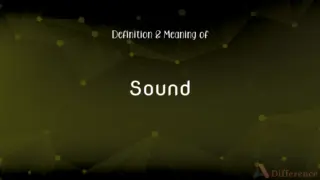
Previous Term
Sound Definition and Meaning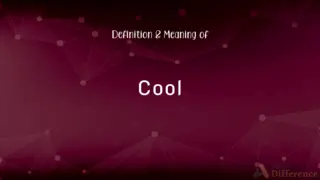
Next Term
Cool Definition and MeaningAuthor Spotlight
Written by
Maham LiaqatEdited by
Tayyaba RehmanTayyaba Rehman is a distinguished writer, currently serving as a primary contributor to askdifference.com. As a researcher in semantics and etymology, Tayyaba's passion for the complexity of languages and their distinctions has found a perfect home on the platform. Tayyaba delves into the intricacies of language, distinguishing between commonly confused words and phrases, thereby providing clarity for readers worldwide.












